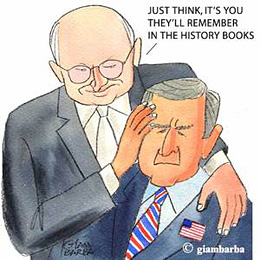 |
 |
 |
 Editorials | February 2007 Editorials | February 2007  
Bush and Cheney Owe an Explanation
 Nicholas D. Kristof - NYTimes Nicholas D. Kristof - NYTimes


| | (Paul Giambarba) |
One way or another, the Scooter Libby trial will soon be over. Whatever the verdict, President Bush and Vice President Cheney owe the American people a candid explanation of what went on in that period in the White House.

I'm not by nature a conspiracy theorist, and I don't presume to know what Bush or Cheney did. But the trial has raised fundamental questions about their involvement on the periphery of allegedly criminal actions, and they need to clear the air. Cheney argued - fatuously, I believe - that it would be inappropriate for him to discuss the matter because of the pending trial; in any case, that burden is removed and he should speak up.

The basic question for Cheney is whether he directed an effort from the White House to tar the reputations of Joe and Valerie Wilson, blame the C.I.A. for misleading him and leak to favored reporters the fact that Valerie worked for the C.I.A. in the W.M.D. area. It sure appears he did all of these. In addition, since Libby and Cheney shared a limousine to work every day, did they ever discuss the statements that Libby was making to the grand jury that are the subject of the alleged perjury? If so, did Cheney encourage him to make those statements? One of the blogs that has covered the Libby trial most closely, Fire Dog Lake, has come up with a detailed timeline raising questions about Cheney. I've already written that if Cheney won't address these questions, he should resign.

The questions about Bush are more modest, and there is less circumstantial evidence of his involvement. But there are two items that have come up that do raise questions and demand a response. One is the June 9, 2003 memo (originally classified "top secret") referring to Bush's interest in my May 6, 2003 column about Joe Wilson and the Niger uranium caper. Libby discussed this with the Grand Jury, in questionning by Fitzgerald:

Q. Does that indicate the President was interested in the State of the Union and the Kristof article?
A. Yes.
Q. And do you recall what the occasion was that, that you came to learn that the President was interested in the Kristof article?
A. I, I don't. It could be something that somebody said to me that I -it doesn't mean that I observed it. It may be something someone said to me and I wrote it down.
Q. Any recollection of discussing with the Vice President the interest of the President in the Kristof article?
A. I don't, I don't have a recollection of it.

Since June 9 was right when there was a bustle of activitiy in the White House on this issue, you have to wonder whether Bush's expression of concern or embarrassment wasn't behind Cheney and Libby's actions. Or it's also plausible that Cheney, who was hot under the collar about it, briefed Bush and Bush promptly forgot. But we do have to know which version is the truth. If Bush was behind the furor, that is something the American people deserve to know.

The other item that raises questions about Bush is the note from Cheney that suggests that it was "the Pres." who asked Libby to take on the Joe Wilson issue with the press. After writing "the Pres." Cheney crossed out those words and simply used the passive, saying that Libby "was asked to stick his neck in the meat grinder." But it sure looks as if he started to say that it was Bush that did so. Why? Was Bush behind the campaign against Wilson?

We just don't know the answers to these questions, and there's not much point speculating. But when serious questions are raised about the integrity of the White House, the President and Vice President owe us answers. | 
 | |
 |



